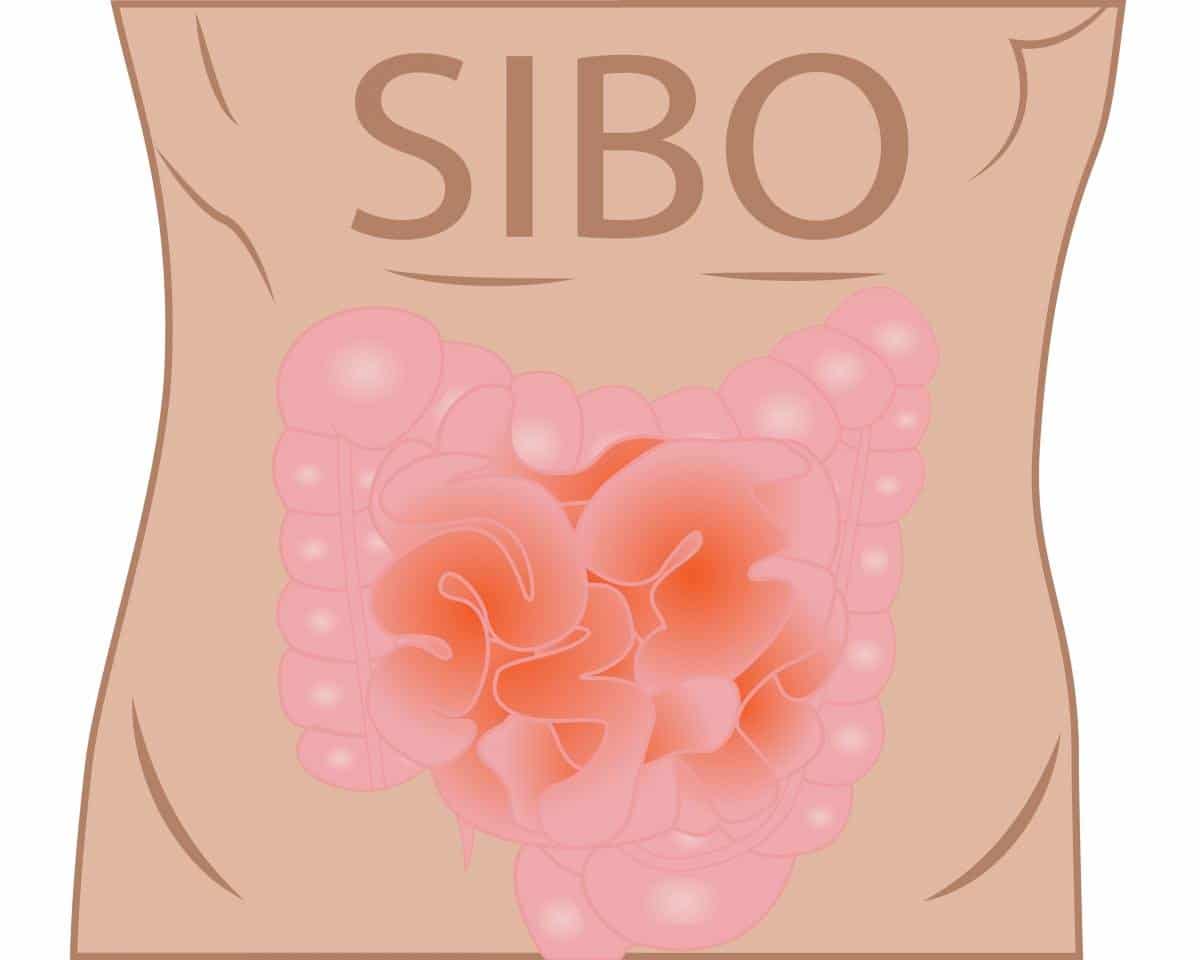Methane SIBO (intestinal methanogen overgrowth)
- SIBO
Methane SIBO (small intestinal bacterial overgrowth) is a term used for SIBO diagnosed through a positive methane breath test. It is often associated with constipation.
While SIBO involves excessive bacterial growth in the small intestine causing digestive symptoms, the term ‘Methane SIBO’ is actually misleading as it refers to an overgrowth of methane-producing archaea.
Arachaea are a micro-organism similar to bacteria that naturally make up part of our gut microbiome (1).
Methane SIBO is also referred to as intestinal methanogen (meaning methane producing) overgrowth (2).
In this article we will explore Methane SIBO in depth, including its underlying causes, symptoms, diagnostic methods, and potential treatment strategies.
Throughout this post we will be referring to methane SIBO as methane SIBO.

What causes Methane SIBO?
Methane SIBO is caused by an overgrowth of archae in the small bowel.
The archaea most commonly seen in methane SIBO are known as Methanobrevibacter smithii.
These archaea utilise hydrogen produced by other gut bacteria and convert it into methane gas (2).
Currently, there is limited research to show what causes this methane SIBO to occur (3).
The limited research that we do have has suggested an association between Methane SIBO and the following (4, 5):
- Being elderly
- Anorexia nervosa (a form of eating disorder)
- Constipation dominant IBS (IBS-C)
Although studies have shown that IBS-C is related to Methane SIBO, it remains unclear as to whether Methane SIBO causes IBS-C or if IBS-C causes Methane SIBO (4).
In anorexia nervosa, the body may increase the number of archaea in the gut as a way to extract more nutrients from the limited food intake (5).
What are the symptoms of Methane SIBO?
Below we will explore the common symptoms and why you may experience these.
If you have Methane SIBO, you may experience these symptoms:
- Constipation
- Bloating
- Abdominal pain
Methane SIBO is particularly strongly associated with constipation. Methane produced by the archaea impacts the muscles in the intestines by reducing their ability to contract. This can lead to slower bowel motility (6).
Research has shown that while a positive hydrogen breath test is associated with the diarrhoea-predominant IBS, a positive methane breath test is positively associated with constipation-predominant IBS subtype (IBS-C) (7, 8).
In fact, the more methane someone produces during the breath test, the greater the severity of constipation (9).
How is Methane SIBO diagnosed?
In this section, we will discuss how it is diagnosed, how the test works and the limitations to these tests.
A methane breath test is the only test currently available for Methane SIBO (11).
Individuals should perform both a hydrogen and methane breath test to diagnose SIBO.
How does the breath test work?
During the breath test for Methane SIBO, you will consume a liquid solution containing glucose or lactulose and breath samples will be collected over three hours.
Archaea in the gut ferment the solution, producing gases that are absorbed into the bloodstream, exhaled, and collected in the breath samples for laboratory evaluation (14).
For further information on how breath tests work, see our post on hydrogen breath testing.
If you are thinking about ordering a commercial home test, be wary as the cut-off points for diagnosis. As recommended in the guidelines, may differ in the home tests as they are not regulated, resulting in an incorrect test result (15).
Can Methane SIBO be treated?
Yes, it can be treated.
The only proven form of treatment is antibiotics. However we will explore other treatment options that you may have heard of below.
Antibiotics as a treatment for methane SIBO
Managing Methane SIBO can be challenging, as archaea are more resilient and less responsive to treatment compared to hydrogen-producing bacteria.
Lack of antibiotic success is due to multiple species of archaea being resistant to most antibiotics (12).
That being said, antibiotics are unfortunately the only treatment method for Methane SIBO currently available.
Most research has reflected that using a combination of antibiotics rather than one alone has been found to reduce methane levels to an undetectable level.
Two such antibiotics include rifaximin and neomycin.
In a research study, this antibiotic combination reduced methane to undetectable levels for 87% of study participants compared to only 28-33% of participants who used either of these antibiotics alone (16).
Although some antibiotics show promise for the treatment of Methane SIBO, research is still limited.
Limited research means that in most countries these antibiotics are not yet licensed in the treatment of methane SIBO.

Can Methane SIBO be treated with probiotics?
The term probiotic refers to live microorganisms ( e.g. bacteria, yeasts etc.) that have a positive effect on your health or on a symptom you may have.
We have a separate post on can you take probiotics for SIBO? which provides more in depth information on this topic.
One study suggests that there may be a beneficial effect from using a specific probiotic known as lactobacillus reuteri with those who have Methane SIBO.
A four week course of this probiotic resulted in a significant decrease in methane production, and a negative methane breath test in 18 out of 20 participants.
However, the sample size was small with only 20 participants in the study. This means that more research needs to be done before it is a recommended treatment option (17).
This specific probiotic strain is unfortunately not available to buy commercially at the correct dose.
Herbal Supplementation, The low FODMAP diet and The elemental diet.
You may have heard that herbal supplements, the low FODMAP diet or an elemental diet may be treatment options for SIBO.
There is currently very little research looking specifically at Methane SIBO into any of these treatment options.
There is a case study which trialled a combination of prokinetics (a drug which enhances gastrointestinal motility), an elemental diet and low fodmap diet as a combined treatment for a person who had Methane SIBO (18).
Although the study shows that such interventions may be of benefit, these findings cannot be generalised to the general public as there was only one person in the study and other people may react differently to such treatment.
To read more about the Low FODMAP Diet and the elemental diet in the context of SIBO, read our blog post on: Small Intestinal Bacterial Overgrowth.
Overall, more research is needed into alternative therapies as well as further research into antibiotic therapies to strengthen recommendations.
As constipation is a very common symptom with methane SIBO, you may find our article “What Is Constipation and How Can You Treat It” a very useful tool when treating methane SIBO.
Summary
Methane SIBO is a relatively newly recognised condition with further research needed to improve overall treatment options.
Symptoms include a range of digestive symptoms and diagnosis is done via breath testing or antibiotic trial.
Antibiotics are the only recommended and proven treatment for SIBO currently, with more research being needed into alternative therapies.
It is important that you get a diagnosis initially from your doctor.
A dietitian may then be able to help with the underlying cause of Methane SIBO such as IBS-C. They can also help to overall optimise gut health, especially while undergoing antibiotic therapy.
Written by Elouise Rice, Registered Dietitian, reviewed by Kirsten Jackson, Consultant Dietitian BSc Hons, RD, PG Cert